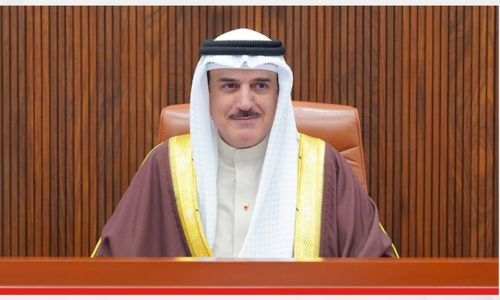The Council of Representatives on Tuesday voted down the Consolidated Final Account for 2022 after extensive deliberation.
This resolution, in concordance with the recommendations by the Committee on Financial and Economic Affairs, saw 20 members vote in favour of rejecting the account, with 8 voting against the committee recommendation and 2 abstentions.
This outcome follows a directive from the committee, which called for the government and National Audit Office (NAO)-affiliated entities to rectify issues highlighted in the NAO report.
The committee emphasised the need for correcting past mistakes, adopting investigative auditing, reducing public debt, and enhancing employment for Bahraini citizens.
Dr. Isa Naser Alnoaimi, representing the NAO, informed the council that the office completed 106 oversight missions, issued 160 reports, made 1127 recommendations, and produced 109 follow-up reports over the past year.
MP Hasan Ebrahim expressed concerns about the livelihoods of 300 individuals stemming from the NAO report on the Khatwa programme, which indicated lapses and neglect in the responsibilities of officials and staff within the Ministry of Social Development. This includes the endorsement of unqualified statements and suspicions of document signature forgery.
Misdeeds
Assuaging these concerns, H.E. Ghanim Al Buainain, Minister for Shura Council and Council of Representatives Affairs, assured the council that “no individual shall bear the onus of others' misdeeds” while emphatically stressing that “the results of the ongoing investigation must not be pre-empted.”
On behalf of the Ministry of Finance and National Economy, Mr. Mubarak Matar stated, “Facing a deficit necessitates borrowing. The public debt is estimated at 16.7 billion. Key strategies for debt reduction included curbing the growth of public debt, fostering economic growth, and ensuring sustainability.” He added that “a recovery plan is in place to achieve fiscal equilibrium.”
H.E. Hamad Al-Maliki, the Minister of Cabinet Affairs, affirmed that updates were made with regard to the government's actions in response to the NAO's report.
Novel approach
The government has embraced a novel approach and set up model standards to boost the rate of recommendation implementation. A digital system has been developed to facilitate the monitoring process.
MP Dr. Mahdi Alshowaikh levelled scathing criticism of negligence at the Ministry of Health, referencing the NAO report's findings on government hospitals, which indicate a lack of adherence to required procedures in Jidhafs Hospital and Salmaniya Medical Complex, confirming the spread of antibiotic-resistant bacteria.
Reasons cited include a shortage of isolation rooms, inadequate patient-to-staff ratios, internal infections, poor sterilisation quality, and infection control adherence rates below 50%.
Initiative
In retort, Dr. Maryam Aljalahma, CEO of the National Health Regulatory Authority, stated, “Service enhancements are evident, including a definitive strategy with monitored performance metrics, and a strategic blueprint is in development. It is crucial to recognise that no infection outbreak is present and that the infection control department is fully functional. For emergencies, we employ the Canadian triage system, and patient wait times have been curtailed, with no one exceeding a 24-hour wait. An initiative to further reduce operation wait times will be unveiled shortly.”
On behalf of the Financial and Economic Affairs Committee, MP Mohammed Salman Al Ahmed remarked, “In our budgetary deliberations, the Finance Committee endeavours to preserve the allocations for the Ministry of Education and the Ministry of Health, given their paramount importance, while overlooking minor expenditure infractions.”
Reforms
The NAO’s recommendations have precipitated case referrals to the Public Prosecution and enhanced the performance of the Future Generation Reserve. The establishment of audit and oversight committees, along with the integration of qualifications into the national framework, are indicative of ongoing reforms.
The report also acknowledges progress in customs affairs and the operations of the Information and e-Government Authority. The Financial and Administrative Control Office has implemented a substantial number of the NAO’s recommendations, with aspirations to expand the qualification listing.
MP Maryam Al Saegh commented on the observed violations within the Ministry of Social Development, with particular emphasis on disability requests and the delays in compensation for individuals with disabilities.
Unresponsiveness
She highlighted the years of unresponsiveness and the incomplete compensation despite committee approval some 21 months prior. She also drew attention to the inadequate support for individuals with autism, including the absence of care homes and vocational rehabilitation facilities tailored to their needs.
Addressing the council, the Minister of Education, H.E. Mohammed bin Mubarak Juma, stated that “the level of spending on Ministry of Education projects in 2022 differs from the levels of spending in 2023 with regard to projects. It reached 97% in 2023, and when the government sets a budget for a specific project, the spending continues until its completion.”
H.E. Nawaf Al Maawda, Minister of Justice and Islamic Affairs, provided assurances to the council that there were no notes of criminal suspicion within the report. He clarified that the cases under scrutiny by the Public Prosecution were independent of the report, and he stated that the Ministry of Justice had implemented 90% of the recommendations mentioned therein.
Read the full article here











